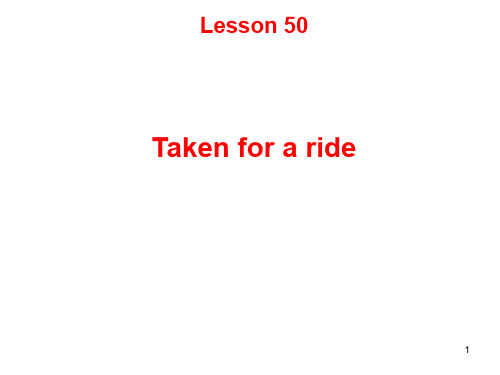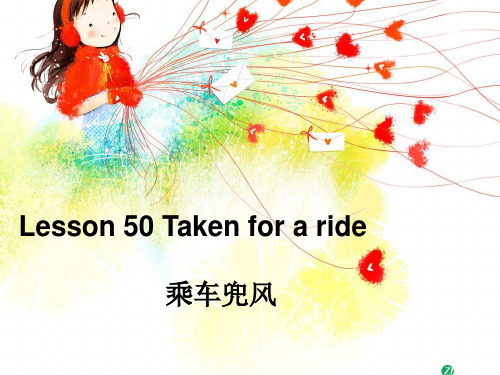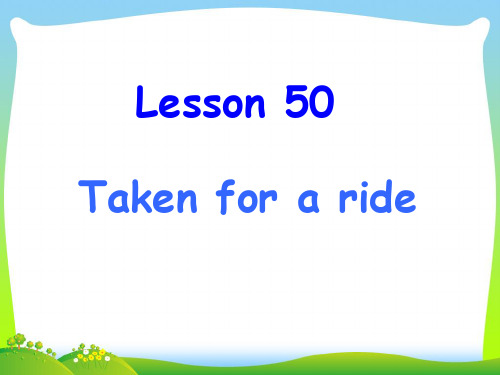新概念2第50课课件
合集下载
新概念英语第二册课件lesson 50

This is as for as we go. as for as 表示程度或是范围
As for as I know, this book hasn’t been translated into Chinese yet.
I forgot to put you off.
put sb. off: 让某人下车
I sat in the front of the bus to get a good view of the countryside.
It was my first view of the ocean.
The car turned the corner and disappeared from our view. a room with a view.
售票员
view [vju:] n. 景色
Questions on the text
Language points
I love travelling in the country, but I don’t like losing my way. the country the countryside lose one’s way: 迷路
My trip took me longer than I expected.
I’ll tell you where to get off.
Looking round, I realized with a shock that I was the only person left on the bus.
This is as for as we go. In that case, I prefer to stay on the bus.
新概念2 第50课 课件

excursion n.远足 recently adv.最近 expect v.期盼 Woodford Green 伍德福德草地 conductor n.售票员 view n.景色 realize v.意识到 shock n.震惊
excursion n. 远足,旅行(集体)
• • • • an excursion train 游览列车 an excursion ticket 旅游特惠票 excursion into sth . 涉足,涉猎 He has an excursion into science.
③country
⒈ 国家(cn)
2.农村(un)
countryside 乡村,暗念偏僻之意
从政治角度来讲:
rural area 农村 suburban area郊区 urban area市区
• Expect, Wait for
• expect可以表示“预计……可能发生(或来到),等待, 期盼”,它表示等待时往往侧重人的心理而不是具体在 某个地方等。 • I expect / I’m expecting to hear from you. • I’m expecting the bus to arrive in the next ten minutes. • My trip took me longer than I expected.
journey,tour,travel,trip,voyage, excursion,expedition
• journey最普通用词,侧重指时间较长、距离较远的单程 陆上,水上或空中的旅行。重点在距离 • tour指最后返回出发地,旅途中有停留游览点,距离可长 可短,目的各异的周游或巡行。 • travel泛指旅行的行为而不指某次具体的旅行,多指到远 方作长期旅行,不强调直接目的地,单、复数均可用。 • trip普通用词,口语多用,常指为公务或游玩作的较短暂 的旅行。 • voyage指在水上旅行,尤指海上旅行,也可指空中旅行。 • excursion较正式用词,常指不超过一天的短时期娱乐性 游玩,也可指乘火车或轮船往返特定景点的远足旅游。 • expedition指有特定目的远征或探险。
新概念二第50课课件

'but I don't know where it is.’
'I'll tell you where to get off,' Answered the tceollnsdbuwcthoer.re to get off“教训某人行为规矩点或 I识s相at点in”the front of the bus to get a good view of the countryside.
'We're going back now,' said the conductor.
'Well, in that case, I prefer to stay on the bus.' I answered. prefer sth. to sth. He prefers cats to dogs. 他喜欢猫,而不喜欢狗。
03
Text
love/ like doing sth. 强调一种习惯 I love travelling in the country, but I don't like losing my way. lose one's way 迷路
I went on an excursion recently, but my tgriopotnooaknmexecluornsgioenr =thhaanvIeeaxnpeecxtceudr.sion 'I' m gotainkge tsob.WsoomodefotirmdeGr花ee费n,某' 人多少时间 I said tthoatnheI ecxopnedcutcetdor比a我s 所I g预o料t o的n(th口e语bu)s,
Exercise
'I'll tell you where to get off,' Answered the tceollnsdbuwcthoer.re to get off“教训某人行为规矩点或 I识s相at点in”the front of the bus to get a good view of the countryside.
'We're going back now,' said the conductor.
'Well, in that case, I prefer to stay on the bus.' I answered. prefer sth. to sth. He prefers cats to dogs. 他喜欢猫,而不喜欢狗。
03
Text
love/ like doing sth. 强调一种习惯 I love travelling in the country, but I don't like losing my way. lose one's way 迷路
I went on an excursion recently, but my tgriopotnooaknmexecluornsgioenr =thhaanvIeeaxnpeecxtceudr.sion 'I' m gotainkge tsob.WsoomodefotirmdeGr花ee费n,某' 人多少时间 I said tthoatnheI ecxopnedcutcetdor比a我s 所I g预o料t o的n(th口e语bu)s,
Exercise
新概念英语第二册第50课-Taken-for-a-ride-乘车兜风PPT幻灯片

• review v. 复习 • preview v. 预习 • interview v. 面试 • overview n. 概述
5
5. lose v. (lost lost )
• lose sb. way • lose a game/war • get lost • {类}loose adj.松散的
10
distance
• a. c.n.&u.n. 距离;间距 e.g. A good cyclist can cover distances of over a
hundred miles a day. 自行车骑得好的人一天可以行驶一百多英里.
• b. c.n.&u.n 远方;远处 e.g. At a distance of six miles you can’t see much. 距离六英里以外的东西很难看清。
What a ride!
• . vt.&vi. (ride, rode, ridden) He jumped on his horse and rode away. Can you ride a horse? 注: ride 用于骑马、骑自行车时,常用作
vt., 即ride a horse; ride a bike; • 用于乘公共汽车时、乘火车时,常用作or a ride • take…for… 把……当作…… • taken for a ride 就当作是一次兜风 • take sb. for a ride 欺骗 • taken for 上当了
8
• 用作名词: go for a ride in a car 乘车出去兜风。 Can I have /take a ride on your bike?
Lesson 50
5
5. lose v. (lost lost )
• lose sb. way • lose a game/war • get lost • {类}loose adj.松散的
10
distance
• a. c.n.&u.n. 距离;间距 e.g. A good cyclist can cover distances of over a
hundred miles a day. 自行车骑得好的人一天可以行驶一百多英里.
• b. c.n.&u.n 远方;远处 e.g. At a distance of six miles you can’t see much. 距离六英里以外的东西很难看清。
What a ride!
• . vt.&vi. (ride, rode, ridden) He jumped on his horse and rode away. Can you ride a horse? 注: ride 用于骑马、骑自行车时,常用作
vt., 即ride a horse; ride a bike; • 用于乘公共汽车时、乘火车时,常用作or a ride • take…for… 把……当作…… • taken for a ride 就当作是一次兜风 • take sb. for a ride 欺骗 • taken for 上当了
8
• 用作名词: go for a ride in a car 乘车出去兜风。 Can I have /take a ride on your bike?
Lesson 50
新概念英语第二册第50课课件

• 1.-- What's his brother?
• -- He is a teacher. He ____ maths at a school.
• A. teach
B. teachs
• C. taught
D. teaches
• 2. Those papers _______ me.
• A. is
• A. spent
B. will spend C. has spent
D. spends
• 3. Now my father _____ his bike to work every day instead of driving. 【上海】
• A. ride
B. rode
C. rides
D. will ride
'I'll tell you where to get off.' answered the conductor.
I sat in the front of the bus to get a good view of the countryside.
After some time, the bus stopped. Looking round, I realized with a shock that I was the only passenger left on the bus. 'You'll have to get off here,' the conductor said. 'This is as far as we go.’ 'Is this Woodford Green?' I asked. 'Oh dear,' said the conductor suddenly. 'I forgot to put you off.’ 'It doesn't matter,' I said. 'I'll get off here.’ 'We're going back now,' said the conductor. 'Well, in that case, I prefer to stay on the bus,' I answered.
新概念第二册50课课件.

loose adj. 松动的,松的,松开的
• Serveral screws have come loose. (come loose,松了(系动词+adj.) • The handle of this suitcase is very / has come loose.
miss
v. 怀念, 思念, 错过,未能……,缺(课等),惦念,想念
• Hurry or you’ll miss the train. • I missed my English lesson. • missing adj. 不见了的 • sth. is lost = sth. is missing • missing boy 失踪了的孩子(不能用 “lost” )
• 【Special Difficulties】
Lose, Loose, Miss. lose vt. 失去,丧失,遗失,丢失
• Roy has lost his job again. • She lost her parents when she was sixteen. • If you bet on that horse you will lose your money. (bet on sth 就…… 打赌)
静态动词
• 但是当现在进行时与频度副词 always, constantly,continually, forever等连用时,此时 静态动词也是可以有进行时态的,因为此时表示 的是带有一定感情色彩的,如令人不满、厌烦或 关心、赞叹的事。 • e.g. You're always seeing something strange. • I'm continually forgetting people's name. • He is being polite today. • ‘I think you are cool.’ – state verb meaning ‘in my opinion’. ‘I am thinking about buying a motorbike.’ – action verb meaning ‘considering’
新概念英语第二册50课PPT课件

3.What did the writer realize when the bus stopped?
4.Why did the writer not get off the bus at woodford Green?
A: Woodford Green.
No, he didn't.
A: The conductor promised to tell him where
lose one's job lose one's temper lose weight / put on weight lose one's cool 怒不可遏 lose one's face lose one's head 昏头了,冲动 lose one's life 遇害,丧生 lose one's breath 上气不接下气
to get off.
A: The writer realized the conductor had
forgotten to put him off.
A: Because the bus would go back and pass
Woodford Green.
Language Points:
1. Taken for a ride
3. miss v. 想念,错过 eg: We must hurry or we'll miss the train. I miss you very much.
lost missing gone
﹡lost 表示“丢失”,含有失去后难以找回的意味 ,在句中可作定语,表语和补语。 eg: The parents found the lost child at last. His elder brother was lost at sea.
新概念2-第50课-课件(共28张PPT)

标题taken 前省略了I was。作为非正式用 语take someone for a ride意为 “欺骗某人 (尤指想从某人那儿骗钱)”。所以,这 个题目也可译作 “上了一当”。
1 . I love travelling in the country, but I don’t like losing my way. 我喜欢在乡间旅行,但却不愿意迷路。 (1)love to do sth & love doing sth love 后面用不定式作宾语的话,也就是love to do sth 是 指特定或具体某次行为;用动名语作宾语,表示一般倾向 或习惯性动作。例:I like swimming of course, but I don’t like to swim today because I don’t feel well. 我当然喜欢游泳,但今天我不想去因为我觉得不舒服。
where to get off. 要是她再想叫我做这做那,我会叫她识相点儿。
5.I sat in the front of the bus to get a good view of the countryside. 我坐在汽车的前部,以便饱览农村风光。
in front of & in the front of in front of 指在某一物体外的前面,其反义词为behind; in the front of 指某一物体里面的前部分,有时用at the front of,其反义词是at the back of。 比较: The man is sitting in the front of the car. 那个男人坐在车的前部。(在驾驶员旁边)
lose one’s way look around go on an excursion with a shock in the front of as far as get a good view of put sb off after some time in that case
1 . I love travelling in the country, but I don’t like losing my way. 我喜欢在乡间旅行,但却不愿意迷路。 (1)love to do sth & love doing sth love 后面用不定式作宾语的话,也就是love to do sth 是 指特定或具体某次行为;用动名语作宾语,表示一般倾向 或习惯性动作。例:I like swimming of course, but I don’t like to swim today because I don’t feel well. 我当然喜欢游泳,但今天我不想去因为我觉得不舒服。
where to get off. 要是她再想叫我做这做那,我会叫她识相点儿。
5.I sat in the front of the bus to get a good view of the countryside. 我坐在汽车的前部,以便饱览农村风光。
in front of & in the front of in front of 指在某一物体外的前面,其反义词为behind; in the front of 指某一物体里面的前部分,有时用at the front of,其反义词是at the back of。 比较: The man is sitting in the front of the car. 那个男人坐在车的前部。(在驾驶员旁边)
lose one’s way look around go on an excursion with a shock in the front of as far as get a good view of put sb off after some time in that case
- 1、下载文档前请自行甄别文档内容的完整性,平台不提供额外的编辑、内容补充、找答案等附加服务。
- 2、"仅部分预览"的文档,不可在线预览部分如存在完整性等问题,可反馈申请退款(可完整预览的文档不适用该条件!)。
- 3、如文档侵犯您的权益,请联系客服反馈,我们会尽快为您处理(人工客服工作时间:9:00-18:30)。
2. I went on an excursion recently, but my trip took me longer than I expected. 最近我作了一次短途旅行,但这次旅行所花费的时间比我 预计的要长。 (1)Go on an excursion 作一次郊游 Excursion 指 “短途旅行,远足,集体游览”,着重在短 距离而准备迅速返回的游览、娱乐活动。表示 “旅行” 之意的名词通常与go on连用,它在这里的含义为“为 (某一目的)而去”: I'll go on holiday next month. 我下个月去度假。 Did you go on a trip last month? 你上个月去旅行了吗
除了以上动词外,另外有些表示所属关系以及喜好、憎恶、 需要等感情的动词通常也只用于一般现在时而不用进行时 的。这些动词包括: belong to(属于), consist of(由…组成), contain (包含;包括), desire(期望;希望), dislike(不喜 欢), hate(憎恨), hope(希望), love(爱), matter (有关系;要紧), mean(意思是;意谓), mind(介 意), need(需要), want(想要), wish(希望;愿 望)。 This box contains 48 matches.盒子里有48根火柴。 Those papers belong to me.这些报纸是我的。 He needs a new pair of shoes. 他需要一双新鞋。 I hate writing letters.我讨厌写信。
Lesson 50 Taken for a ride 乘车兜风 标题taken 前省略了I was。作为非正式用 语take someone for a ride意为 “欺骗某人 (尤指想从某人那儿骗钱)”。所以,这 个题目也可译作 “上了一当”。
1 . I love travelling in the country, but I don’t like losing my way. 我喜欢在乡间旅行,但却不愿意迷路。 (1)love to do sth & love doing sth love 后面用不定式作宾语的话,也就是love to do sth 是 指特定或具体某次行为;用动名语作宾语,表示一般倾向 或习惯性动作。例:I like swimming of course, but I don’t like to swim today because I don’t feel well. 我当然喜欢游泳,但今天我不想去因为我觉得不舒服。 2)lose one’s way 迷路
Conductor 是在这里是 “售票员” 的意思,它也可以用 来表示 “音乐指挥”。 get on与 get off为一对反义词,分别表示“(从汽车等上) 下来”和“登上(汽车、火车等)”,on与off既可以作 副词又可以作介词:
4 .‘I'll tell you where to get off,’ Answered the conductor. “ 我会告诉您在哪儿下车,” 售票员回答说。 where to get off 作tell的直接宾语。这句话实际上是个 双关语,tell sb where to get off 是个习语,非正式地 表示 “教训某人行为规矩点或识相点”: If she tries to tell me what to do again, I’ll tell her where to get off. 要是她再想叫我做这做那,我会叫她识相点儿。
5.I sat in the front of the bus to get a good view of the countryside. 我坐在汽车的前部,以便饱览农村风光。
in front of & in the front of in front of 指在某一物体外的前面,其反义词为behind; in the front of 指某一物体里面的前部分,有时用at the front of,其反义词是at the back of。 比较: The man is sitting in the front of the car. 那个男人坐在车的前部。(在驾驶员旁边) The man is sitting in front of the car. 那个男人坐在车的前面。(车的外面)
Lesson 50 Taken for a ride
乘车兜风
New words and expressions 生词和短语 ride n. 旅行 excursion n. 远足 conductor n. 售票员 view n. 景色
本课语法 :一般现在时 在第2课中,我们讲了一般现在时用于表达“有规律的, 或是习惯性的动作”。(often/always) 在第26课中,我们又讲了了一般现在时的用法: 当我们要表达一个永恒不变的或是有规律的动作时,也 就是用于普遍性真理时,我们必须用 一般现在时。比如: The earth goes round the sun.地球围绕太阳转。 表示状态和感觉的静态动词我们使用一般现在时而不用 于进行时,比如: appear(出现), appreciate(感激), believe(相 信), feel(感觉), forget(忘记), hear(听到), know(知道), like(喜欢), look(看起来), notice (注意到), remember(想起), resemble(相似), see(看到), think(认为), understand(理解)。
3. ‘I’m going to Woodford Green,’ I said to the conductor
as I got on the bus, ‘but I don’t know where it is.’ “ 我要去伍德福德草地,” 我一上车就对售票员说, “但 我 不知道它在哪儿。”
